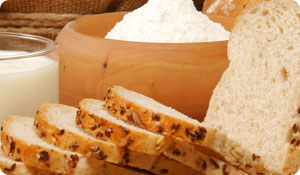
Maintaining a fiber-rich diet is a great way to shed unwanted pounds, lower your cholesterol and keep your bowels functioning normally. Unfortunately, foods high in fiber can also cause increased gas (flatulence), which can be not just embarrassing but painful as well. The gas occurs because bacteria in the colon are able to digest fiber. The gas you produce is a by-product of the bacteria's digestion of the fiber. How much gas you experience is determined by the variation in the bacteria's ability to digest different types of fiber.
Gas-Producing Foods
Most foods that contain carbohydrates can cause gas. Some of the most common high-fiber, gas-producing foods include:
- Beans
- Foods containing sorbitol, such as dietetic foods and sugar-free candies and gums
- Fruits, such as pears, peaches, prunes and apples
- Milk products, such as cheese and ice cream and packaged foods prepared with lactose, including bread, cereal and salad dressing
- Oatmeal and oat bran
- Soft drinks and fruit drinks
- Vegetables, such as asparagus, broccoli, Brussels sprouts, cabbage, onions, artichokes
- Whole-wheat foods, including cereals, breads and pastas
Eating Healthy Without the Gas
There are ways for you to maintain a fiber-rich diet without the gas pains. Rather than saturating your body with high-fiber foods all at once, try introducing fiber into your diet slowly. For example, add a new source of fiber to your diet one-by-one every week or so to let your body adjust to processing the extra fiber. Here are some other tips to try:
- Drink plenty of water. Dehydration can harden stools and cause constipation and intestinal gas. Drinking eight glasses of water a day can help keep your stools soft.
- Don't chew gum. Chewing gum allows extra air to be swallowed, which can create intestinal gas. Drinking beverages through a straw also increases your intake of air as does smoking. Eating foods slowly can reduce the amount of air being swallowed and limit excessive gas.
- Maintain physical activity. Thirty minutes of moderate exercise three times a week can help increase intestinal contractions and relieve constipation, which can produce excess intestinal gas.
- Keep a food journal. Making a list of the foods you eat and their effect on your digestive system can help you spot the types of foods giving you the most problem with extra gas.





